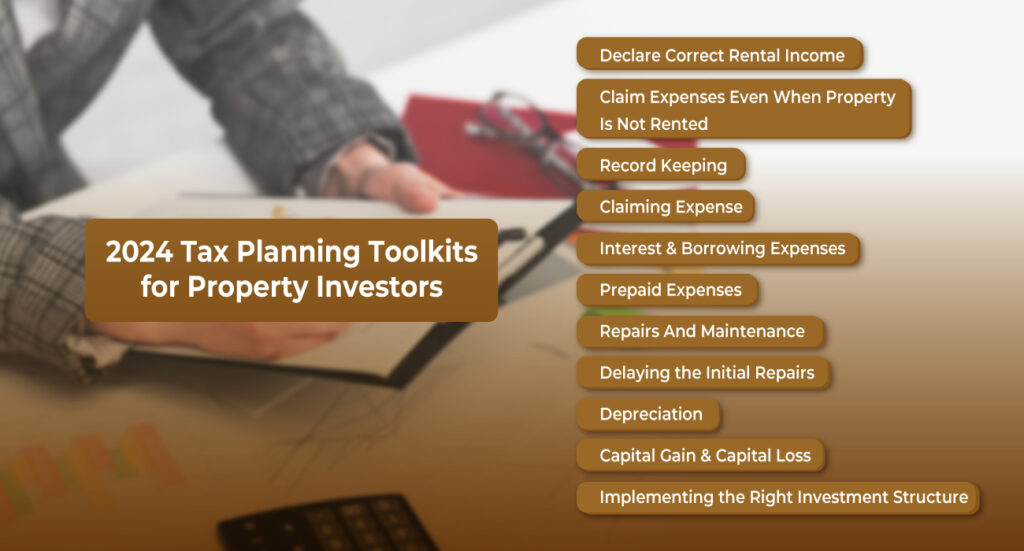2024 Tax Planning Toolkits for Property Investors
As June 2024 approaches, property investors face a unique set of challenges and opportunities in the Australian real estate market. With inflation on the rise and interest rates remaining high due to the Reserve Bank’s ongoing measures to control economic pressures, investors are feeling the financial pinch more than ever. These economic conditions have led to increased costs in property maintenance, mortgage repayments, and general living expenses, compelling investors to seek effective strategies to manage their cash flow and tax obligations.
In this second instalment of our year-end tax planning toolkits series, we shift our focus to property investors. At Investax Group, we understand the critical importance of strategic tax planning and the need to optimise your financial position in a volatile market. This guide is designed to provide property investors with actionable insights and practical strategies to minimise their tax burden and enhance their financial health. From understanding the benefits of depreciation schedules to leveraging interest deductions and exploring the advantages of negative gearing, our comprehensive guide will equip you with the knowledge necessary to navigate the complexities of property investment taxation.
Whether you own residential, commercial, or mixed-use properties, our goal is to help you make informed decisions that align with your long-term financial objectives. If you require immediate assistance or personalised tax planning advice, our team of Investax Group specialists are ready to support you. Let’s explore the key tax planning strategies for property investors to ensure you are well-prepared for the end of the financial year.

Declare Correct Rental Income
Property investors often incorrectly report income in their tax returns when they purchase property as joint tenants or tenants in common. A common issue is children reporting 100% of the rental income in their tax returns when their parents are also part owners of the investment property. You may think that since you receive 100% of the income and pay all expenses, you should report all the income. However, the correct method of reporting income and expenses is based on the property’s legal ownership. If you own 50% of the property, you should report 50% of the income, regardless of how much rental income is deposited into your account.
For example, if Sarah’s mom transferred 70% of the property title to Sarah and kept 30% ownership, and the property is tenanted with Sarah receiving 100% of the income in her bank account, Sarah should report 70% of the income in her tax return, while her mom should report the remaining 30%. Sarah, in this case, acts almost like an agent for her mom’s share of the income. She is not liable to pay tax on the 30% of the property income that belongs to her mom, as she is not the full owner of the property.
Note: Report rental income based on your ownership percentage
Claim Expenses Even When Property Is Not Rented
Many investors apportion their expenses based on the number of weeks the property earned rental income. However, the ATO allows property investors to claim ongoing expenses if the property is genuinely available for rent, even if it didn’t earn rental income. A property is genuinely available for rent if it is advertised in ways that provide broad exposure to potential tenants and if the rental conditions are reasonable and not overly restrictive.
Some expenses you can claim as long as the property is genuinely available for rent, even if it didn’t earn rental income, include bank charges, loan interest, body corporate fees, council rates, insurance, land tax, and depreciation.
Some expenses do not need to be apportioned because they are directly linked to your rental income. These include advertising for tenants, real estate agent commissions, letting fees, costs of removing rubbish left by tenants, and costs of repairs for damage done by tenants.
Note – Claim ongoing expenses if the property is genuinely available for rent, even without rental income.

Record Keeping
Most savvy investors are aware of which expenses are tax deductible against their rental income. However, it is crucial to remember that you will need proof of expenses to claim tax deductions. The ATO may reject tax deduction claims even if the expense is legitimate.
For example, if you are claiming interest on a bank loan, it is a straightforward claim as interest expenses are tax deductible if the property is earning rental income. However, if the ATO reviews your tax return and you fail to provide bank statements to substantiate the interest expense, they will reject the deduction. Many think it’s easy to retrieve information from the bank, so keeping records seems unnecessary. However, we have seen instances where clients did not keep bank statements and later refinanced the loan with another bank, making it difficult to retrieve old loan information from the previous bank.
Therefore, we suggest always keeping records of every expense claim. Generally, you need to keep these records for five years from the date you lodge your tax return.
Note – Keep expense records for at least five years to substantiate tax deductions.
Claiming Expense
Investment property expenses are a crucial aspect of end-of-year tax planning. One of the key questions we always get is, “We recently purchased a property; what expenses can we claim against our investment property?” Whether you are a new or a seasoned property investor, it is beneficial to revisit general expenses for investment properties. Most expenses related to your investment property are tax deductible, except for purchase-related costs like stamp duty, buyer’s agent fees, conveyancer fees, and capital costs such as replacing a roof, floorboards, or adding a new patio. While these capital costs can be claimed as part of your depreciation schedule, meaning you can deduct them over a period of several years, they are not eligible for immediate deduction in the year they are incurred. This allows you to spread the tax benefit over the useful life of the improvement, rather than receiving it all at once.
Common tax-deductible expenses for investment properties include advertising for tenants, loan interest, council and water rates, landlord and building insurance, land tax, letting fees, property agent fees, body corporate fees, depreciation, and the cost of hiring a quantity surveyor to prepare a depreciation schedule. These expenses help reduce your taxable income and increase the overall profitability of your investment.
The first rule for claiming these expenses is that the property must be rented or genuinely available for rent, and the expenses must be incurred by you, not by the tenants. This means the property should be actively advertised to attract tenants, with reasonable conditions that do not restrict potential renters.
The second rule is that you must have receipts and invoices to substantiate your claims. Keeping detailed records of all expenses related to your investment property is crucial. These documents serve as proof of your expenditure and are necessary if the ATO audits your tax return. By maintaining proper documentation, you can ensure that you maximize your tax deductions and stay compliant with tax regulations.
Investment property expenses can be complex due to various situations that can affect the deductibility of expenses. We have recently written a two-part article about “What You Shouldn’t Claim” and “What You Should Claim” against your investment property. Please check these articles if you haven’t read them yet.
Note – Most investment property expenses are tax deductible, except for purchase-related costs and capital expenditures.

Interest & Borrowing Expenses
Interest paid on your investment or home loan is tax deductible, provided the loan was used to purchase an income-producing property. This includes the interest on a personal loan if you use it to pay for your investment property deposit, stamp duty, legal fees, and similar expenses. Many investors use equity from their Principal Place of Residence (PPOR) to buy an investment property.
However, be cautious with interest claims. If you use an equity loan taken against your investment property for personal purposes—such as paying a deposit for a new home, buying cars, or boats—it won’t be tax deductible. Even if the loan is secured against your investment property, it must be used for the property that generates rental income to remain tax deductible. For example, property renovations aimed at increasing rent, liveability, or property value, as well as other expenses related to the investment property, are considered tax-deductible transactions.
One common item we often see people miscalculate or completely forget to claim is borrowing expenses. When you take out a mortgage or loan, you generally incur borrowing expenses. These can include loan establishment fees, title search fees, and document checking costs. One of the largest borrowing expenses is lenders mortgage insurance (LMI), usually charged by banks if you borrow more than 80% of the property’s value. If the borrowing cost exceeds $100, these fees must be amortized over five years.
Note – The loan or equity withdrawal must be used for an income-producing asset to make the interest tax deductible.
Prepaid Expenses
Many taxpayers believe that prepaid expenses are only eligible for business owners. However, this is far from the truth. The ATO allows individuals to claim deductions for prepaid non-business expenses if they are for a period of 12 months or less and do not extend beyond the next financial year.
Non-business expenditure is any expense incurred in gaining assessable income from activities not related to carrying on a business. The most common forms of non-business income include wages, dividends, and rental income from investment properties.
You can generally prepay expenses such as loan interest, council rates, and insurance premiums to claim a tax deduction in the month of June.
For instance, Sarah discovered that she would have an unexpected tax bill in the 2024 financial year due to a large bonus of shares issued to her as part of an Employee Shares Scheme. To reduce her tax bill, she consulted with her income tax specialist and decided to prepay the next 12 months’ interest on her loan. She had no cash flow burden due to the sale of some of her bonus shares. This prepayment covers until June 2025, aligning with the ATO’s prepayment rules. Additionally, she chose to prepay her insurance premium for her landlord insurance to minimize her tax liability.
Note – You can claim tax deductions for prepaid expenses if they cover 12 months or less and do not extend beyond the next financial year.

Repairs And Maintenance
Ensure you claim all eligible repairs and maintenance expenses related to your investment property. A repair is defined as restoring the efficiency or function of an asset without changing its character, thereby maintaining it in its original state. This means you can fix defects or renew parts, but you can’t completely reconstruct an item.
Here are some examples of allowable repairs, maintenance, or replacements provided by the ATO:
- Painting: Refreshing the property’s appearance and protecting surfaces.
- Conditioning gutters: Ensuring proper drainage and preventing water damage.
- Maintaining plumbing: Fixing leaks, unclogging drains, and keeping water systems functional.
- Repairing electrical appliances: Fixing or replacing faulty wiring, switches, and appliances.
- Mending leaks: Addressing roof leaks, pipe leaks, and other water intrusion issues.
- Replacing broken parts of fences or broken glass in windows: Restoring security and aesthetics.
- Repairing machinery: Fixing equipment used for property maintenance, such as lawn mowers or HVAC systems.
Note – Repairs to address any wear and tear caused by your tenants are tax deductible.
Delaying the Initial Repairs
Maintaining current cash flow is crucial for property investors. Knowing when to spend money and when to hold back is essential. Many investors think about making improvements as soon as they purchase a property, assuming these expenses will be tax deductible. However, expenses for initial repairs of existing damages when you bought the property are not eligible for immediate tax deduction, even if they are genuine repairs and maintenance.
For example, if after purchasing a property, you hire a handyman to fix a broken window, repair damaged floorboards, or touch up paint, these are considered repairs and maintenance expenses. These expenses are tax deductible for investment property owners, but only if they are incurred after the property is rented. This means that any initial repairs made immediately after the property settlement and before renting the property do not qualify for immediate tax deductions.
Instead, you may be able to claim these expenses as a capital works deduction over several years. These costs are also used to calculate your capital gain or capital loss when you sell the property. By understanding how these deductions work, investors can strategically plan their expenses to maximize tax benefits and maintain a healthy cash flow.
Note – Initial repairs made immediately after settlement and before renting the property are not immediately tax deductible.

Depreciation
One of the most commonly missed items by property investors is claiming depreciation. It is one of the most overlooked tax deductions for investment properties. Generally, you need to spend money to claim a tax deduction, but property depreciation is an exception. The ATO allows property investors to claim depreciation for their property, which accounts for the wear and tear of their assets as they age and are used by tenants. As items get older, their value decreases, and you may eventually need to replace them.
Property investors who signed a contract for the purchase of a second-hand residential property after 7:30 pm on May 9, 2017, are not eligible to claim property depreciation on plant and equipment (Division 40). However, you can still claim tax depreciation on brand-new plant and equipment, such as a new oven, dishwasher, carpet, and air-conditioning units, if you replace the old items after the property purchase. You are also eligible to claim depreciation on plant and equipment if the property is an off-the-plan property and has not been used by you or anyone else as a home.
For second-hand properties, the often-missed item is Capital Works, also known as Division 43. This covers depreciation for the building itself, including built-in wardrobes, toilets, vanities, concrete slabs, walls, and timber frames. You can contact a quantity surveyor to assess the eligibility of the depreciation when you purchase a second-hand property. Please feel free to contact Investax Group if you have purchased a second-hand property but are not claiming Division 43 in your tax return.
Note – Don’t miss out on claiming depreciation for your investment property, especially for Capital Works (Division 43) and eligible new plant and equipment.
Capital Gain & Capital Loss
If you are planning to sell a property but want to defer paying tax until the next financial year, it is crucial to be mindful of the exchange date. For capital gains tax (CGT) purposes, the exchange of contract date triggers the reportable capital gain event. This is a key detail that many investors overlook, assuming instead that the settlement date—when the transfer of title occurs, and the money is received—is what matters.
However, this assumption is incorrect. The CGT liability is based on the date the contract is exchanged, not when the property is settled. For instance, if you sign the contract of sale on June 28, 2024, and the settlement occurs in August 2024, you will be liable for capital gains tax in the 2024 financial year, not the 2025 financial year.
If you are planning to sell multiple assets, many investors prioritize selling those with high capital gains first, thinking this will boost their cash flow. The idea is to sell the more profitable asset quickly and then deal with the less desirable property, which might take longer to sell due to a poor market and might result in a capital loss.
However, this strategy has a flaw: capital losses can only be offset against capital gains. If you sell the asset with the capital gain first and then, in the next financial year, sell the asset with the capital loss, you won’t be able to use the loss to reduce the gain from the previous year. This means you will have already paid the capital gains tax without being able to offset it with the subsequent loss.
To avoid this, consider planning your asset sales to align capital gains and losses within the same financial year, allowing you to balance out gains with losses effectively and minimize your overall tax liability.
Understanding this distinction can help you plan your property sales more effectively, ensuring that you can manage your tax obligations in a way that best suits your financial situation. Always consider the exchange date and consult with a tax professional to optimize your tax planning strategy.
Notes
- Align capital gains and losses within the same financial year to minimize your tax liability effectively.
- Remember, for CGT purposes, the exchange date, not the settlement date, triggers capital gain.
Implementing the Right Investment Structure
Many people purchase property without getting proper ownership advice, often because they are unaware of property tax specialists like Investax Group who can guide them on tax issues, asset protection, estate planning, and more. Ownership structure can make or break your property investment strategy, as any changes after the purchase of property trigger both stamp duty and capital gains tax.
Recently, I encountered a couple who bought a property in their name because they went to auction without having time to consult a property tax specialist about the ownership structure. They ended up owning the property 50-50 with the intention of developing it for sale. The wife, an architect aspiring to be a property developer, later realized that her husband pays the top marginal tax rate, meaning their profits will be taxed at his higher rate when they sell the property. She reached out to Investax to see if the title deed can be changed to minimize tax and save them from any unforeseen risks during the development.
Mistakes like this are common among property investors due to a lack of research and resources. You might need to purchase the property in your spouse’s name to reduce your tax burden, or perhaps a trust would be more suitable for income splitting, asset protection, and estate planning. Alternatively, a company might help reduce your property development business taxes and land tax. Therefore, it’s crucial to consult with experts like Investax property tax and structure specialists to determine the best ownership structure.
There are many factors to consider when aiming to become a serious and successful property investor. For most Australians, property represents the largest investment of their lives. By investing in personal growth and strategic planning, you can ensure that your property investment is worthwhile in the long run. Thoughtful planning and informed decisions can significantly enhance the value and return on your investment.
Note – A well-planned ownership structure can minimise your tax, protect your assets, and reduce generational tax burdens.
Conclusion
As we approach the end of the financial year, property investors must navigate a complex landscape of tax obligations. In this 2024 Tax Planning Toolkit for Property Investors, we’ve explored essential strategies to help you maximise your tax benefits and ensure the long-term success of your property investments. By understanding the importance of declaring correct rental income, claiming ongoing expenses even when properties are not rented, maintaining thorough records, and leveraging various deductions, you can significantly improve your tax position for the 2024 financial year.
To navigate these complexities effectively and optimise your tax planning strategy, consider consulting with property tax specialists. If you do not have an accountant who specializes in property and business tax, please consider reaching out to Investax Group. Our experts can provide invaluable guidance tailored to your specific circumstances, helping you make informed decisions that align with your long-term financial goals. Contact Investax Property Tax Specialists Group today to ensure your property investments are well-prepared for the financial year ahead.
General Advice Warning
The material on this page and on this website has been prepared for general information purposes only and not as specific advice to any particular person. Any advice contained on this page and on this website is General Advice and does not take into account any person’s particular investment objectives, financial situation and particular needs.
Before making an investment decision based on this advice you should consider, with or without the assistance of a securities adviser, whether it is appropriate to your particular investment needs, objectives and financial circumstances. In addition, the examples provided on this page and on this website are for illustrative purposes only.Although every effort has been made to verify the accuracy of the information contained on this page and on our website, Investax Group, its officers, representatives, employees and agents disclaim all liability [except for any liability which by law cannot be excluded), for any error, inaccuracy in, or omission from the information contained in this website or any loss or damage suffered by any person directly or indirectly through relying on this information.
Reference
ATO – Genuinely Available for Rent
ATO – Prepaid Expense





